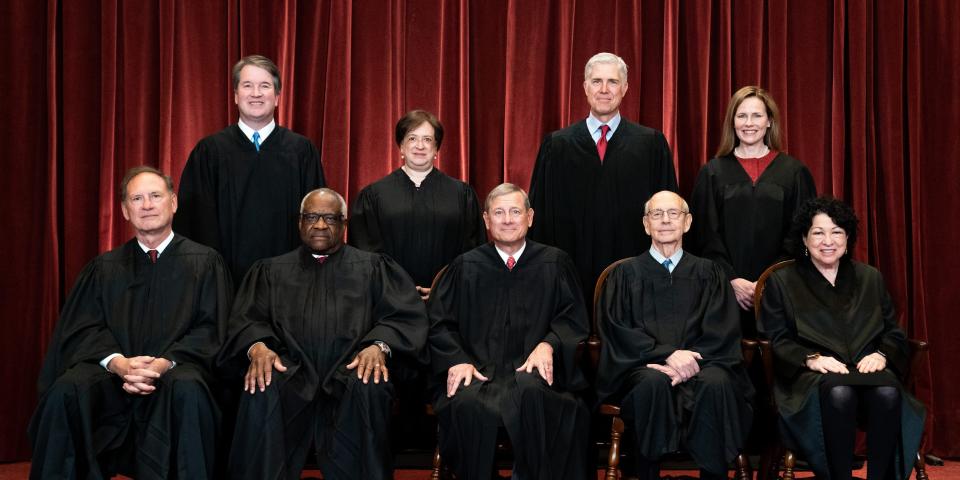Which Supreme Court justices voted to overturn Roe v. Wade? Here's where all 9 judges stand
- Oops!Something went wrong.Please try again later.
- Oops!Something went wrong.Please try again later.
- Oops!Something went wrong.Please try again later.
- Oops!Something went wrong.Please try again later.
- Oops!Something went wrong.Please try again later.

The Supreme Court on Friday overturned Roe v. Wade in a consequential ruling.
Five conservative justices voted to overturn the landmark abortion case.
Here is how each of the nine judges voted.
The Supreme Court on Friday overturned Roe v. Wade in a 5-4 majority opinion that guts federal abortion rights protections previously upheld by the nearly 50-year-old landmark ruling.
The conservative majority voted to uphold the Mississippi law at the heart of the case which seeks to ban abortion after 15 weeks of pregnancy, a contradiction to the standard set by Roe, which allowed abortions until about 24 weeks of pregnancy, at which point a fetus could feasibly survive outside the womb.
Six justices ruled in favor of upholding Mississippi's 15-week ban, but it was the majority opinion of five judges that ultimately led to the total overhaul of Roe v. Wade.
Here's how each justice voted in the monumental decision.
Chief Justice John Roberts
Roberts sided with the 6-3 majority in ruling on the Dobbs v. Jackson Women's Health Organization case. But the chief justice disputed the conservative majority's total rebuke of Roe, instead, opting for a more middle-ground approach that would have allowed Mississippi to keep its statute without nixing federal abortion protections, effectively weakening abortion rights across the country without gutting them completely.
In his concurring opinion, released alongside the majority opinion on Friday, Roberts criticized the court's five other conservative justices, saying they went too far in their decision.
"The Court's decision to overrule Roe and Casey is a serious jolt to the legal system—regardless of how you view those cases," the chief justice wrote, also referring to the 1992 abortion decision that subsequently upheld Roe. "A narrower decision rejecting the misguided viability line would be markedly less unsettling, and nothing more is needed to decide this case."
Justice Samuel Alito
Alito, who was appointed to the court by former President George W. Bush in 2005, led the charge against Roe in writing the conservative majority opinion released Friday.
Much of the final decision's text was included in a leaked draft opinion earlier this year, which included Alito's passionate rebuke of Roe.
"We hold that Roe and Casey must be overruled," Alito wrote in the opinion. "The Constitution makes no reference to abortion, and no such right is implicitly protected by any constitutional provision."
"Roe was egregiously wrong from the start," he continued. "Its reasoning was exceptionally weak, and the decision has had damaging consequences. And far from bringing about a national settlement of the abortion issue, Roe and Casey have enflamed debate and deepened division."
Justice Clarence Thomas
Thomas, the longest-serving judge currently on the court and a conservative stalwart among his colleagues, voted with his fellow conservative block in overturning Roe.
He later separated himself from the majority, however, in writing a concurring opinion acknowledging his different reasoning that allowed him to come to the same conclusion as his other justices. In his opinion, Thomas called for the court to reexamine a slew of 14th Amendment due process clause cases, including past decisions that protect contraception access, same-sex relationships, and same-sex marriages.
Thomas' opinion seemed to contradict Alito's own assurance that the court's decision to revoke abortion rights would not put other civil rights at risk, since abortion is narrowly focused on "fetal life."
Justice Neil Gorsuch
Former President Donald Trump's first Supreme Court appointee, Gorsuch also joined his fellow conservatives to overturn Roe v. Wade.

Justice Brett Kavanaugh
Kavanaugh, who was also appointed by Trump and narrowly confirmed in 2018 following a tense Senate approval process that revolved around decades-old allegations of sexual misconduct against the justice, also voted to overturn Roe v. Wade.
Republican Sen. Susan Collins of Maine and Democrat Sen. Joe Manchin of West Virginia, two moderates who helped confirm both Kavanaugh and Gorsuch, criticized the decision following Friday's opinion, saying they were misled by the justices during private conversations in which they inquired about their stance on abortion rights.
"This decision is inconsistent with what Justices Gorsuch and Kavanaugh said in their testimony and their meetings with me, where they both were insistent on the importance of supporting long-standing precedents that the country has relied upon," Collins said in a statement.
Justice Amy Coney Barrett
Trump's final appointee, Coney Barrett, rounded out the conservative majority in Friday's decision.
While dodging questions about abortion during her confirmation hearing, Coney Barrett suggested that there remained legitimate legal disagreements about Roe v. Wade.
Justice Stephen Breyer
Breyer, who is set to retire this summer, sided with the court's liberal justices in rejecting the majority opinion in a strongly-worded dissent that portends dire consequences for women in the aftermath of Roe's reversal.
"Withdrawing a woman's right to choose whether to continue a pregnancy does not mean that no choice is being made. It means that a majority of today's Court has wrenched this choice from women and given it to the States," they wrote.
"For millions of women, Roe and Casey have been critical in giving them control of their bodies and their lives. Closing our eyes to the suffering today's decision will impose will not make that suffering disappear," they added.
Justice Sonia Sotomayor
Sotomayor, an Obama appointee, also dissented.
In the liberal justices' opinion, they warned that other civil rights could be on the line.
"No one should be confident that this majority is done with its work," they wrote. "The right Roe and Casey recognized does not stand alone."
Justice Elena Kagan
Kagan, who was confirmed to the court in 2010, joined the court's other liberals to dissent.
Read the original article on Business Insider


